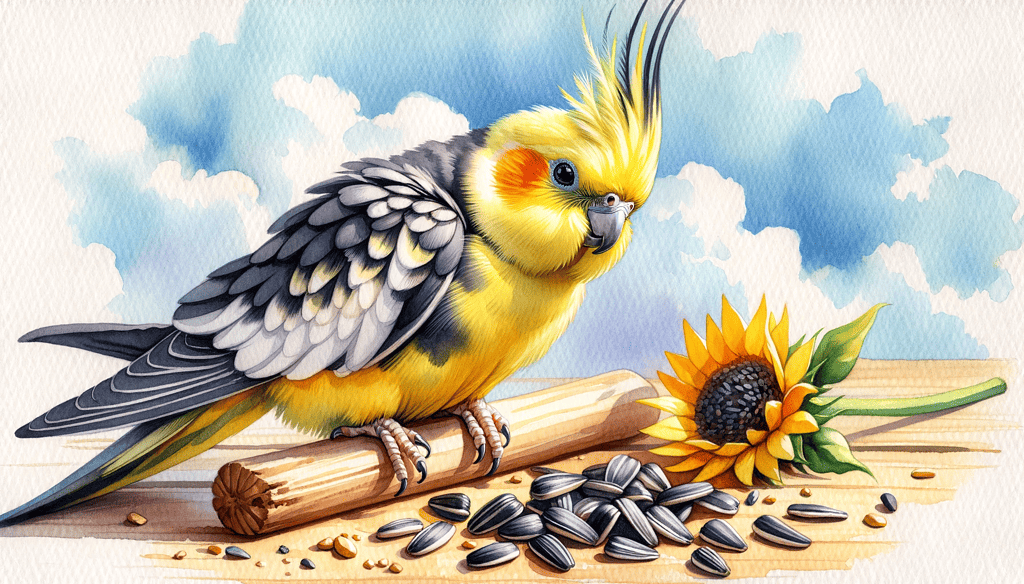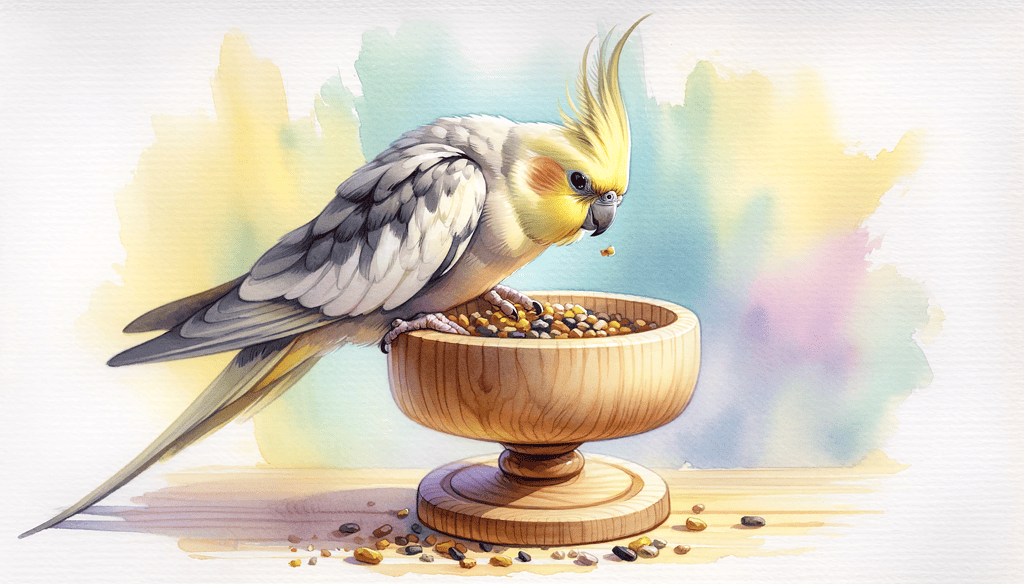
Cockatiels, with their vibrant personalities and cheerful chirps, have won the hearts of many bird enthusiasts. But how do you ensure they get the right nutrition for a healthy and long life? What’s the general feeding rule for these feathered friends?
As a general rule, cockatiels require a balanced diet consisting of seeds, pellets, fresh fruits, and vegetables. Regular feeding times, understanding portion sizes, and recognizing the signs of overfeeding or underfeeding are essential for their well-being.
Dive deeper into this guide to understand the nuances of feeding cockatiels, from portion sizes to the role of treats in training. Let’s ensure your bird gets the best care possible!
What Makes A Balanced Cockatiel Diet?
Cockatiels, like all creatures, require a balance of carbohydrates, proteins, fats, vitamins, minerals, and water. The right diet ensures they not only survive but thrive, showcasing vibrant plumage and exuding energy.
Table: Essential Nutrients, Their Sources, and Benefits for Cockatiels
| Nutrient | Source | Benefit for Cockatiels |
| Carbohydrates | Seeds, fruits | Provides energy |
| Proteins | Pelleted diets, certain seeds | Supports muscle growth and feather development |
| Fats | Seeds like sunflower | Essential for energy storage |
| Vitamins | Fresh fruits, vegetables, pelleted diets | Supports overall health and bodily functions |
| Minerals | Cuttlebone, pelleted diets | Bone health, enzyme functions |
| Water | Fresh water supply | Hydration, digestion |
However, there are common misconceptions about feeding cockatiels:
- Misconception: Seeds alone are sufficient for cockatiels.
Correction: While seeds are a part of their diet, relying solely on them can lead to nutritional imbalances.
- Misconception: All seeds are equally nutritious.
Correction: Cockatiels often prefer certain seeds like millet and sunflower, which are high in fat and lack essential nutrients like calcium and vitamin A.
- Misconception: Cockatiels don’t need fresh fruits and vegetables.
Correction: Fruits and vegetables should constitute 20-25% of their diet, providing essential vitamins and minerals.
- Misconception: Cockatiels will eat anything that’s good for them.
Correction: Birds can be picky eaters. It’s essential to introduce a variety of foods and be persistent in offering them.
- Misconception: Tap water is fine for cockatiels.
Correction: Always provide fresh, clean water, ensuring dishes are cleaned daily.
The Ideal Diet Composition
When it comes to seeds vs. pelleted diets, both have their pros and cons.
Table: Seed Mixes vs. Pelleted Diets
| Aspect | Seed Mixes | Pelleted Diets |
| Nutritional Balance | Often imbalanced, high in fat | Formulated to meet all nutritional needs |
| Variety | Birds might selectively eat only certain seeds | Consistent nutrition in every bite |
| Convenience | Easily available, stored for longer periods | Might require transition from a seed-based diet |
| Health Risks | Can lead to malnutrition if solely relied upon | Ideal for ensuring balanced nutrition |
Fresh vegetables and fruits play a pivotal role in a cockatiel’s diet. They provide essential vitamins and minerals not always present in seeds or pellets. Here are some beneficial options:
- Apple: A favorite among many birds, but always remove the seeds.
- Broccoli: Rich in vitamins and can be given raw or steamed.
- Carrots: Can be offered raw or slightly cooked.
- Spinach: High in calcium, but should be given in moderation.
- Mango: A tropical treat filled with vitamins.
However, not all foods are safe. Some can be toxic or harmful to cockatiels.
Top 5 Toxic Foods for Cockatiels:
- Avocado: Contains persin, which can be deadly to birds.
- Chocolate: Contains theobromine, toxic to many pets, including birds.
- Onions and Garlic: Can cause digestive issues and other health problems.
- Caffeine: Found in coffee, tea, and certain sodas, it can be harmful.
- Alcohol: Even small amounts can be deadly.
Dietary Changes And Age-Specific Needs

As cockatiels journey through different stages of life, their dietary needs evolve. It’s essential to understand these changes to ensure they receive the right nutrients at the right time.
1. Baby and Juvenile Cockatiels
Growing cockatiels have unique nutritional requirements that differ from adults. Their diet must support their rapid growth and development.
Table: Nutritional Needs of Baby Cockatiels at Different Growth Stages
| Growth Stage | Nutritional Need |
| Hatchling | High protein for rapid growth |
| 2-3 weeks | Introduction of soft foods |
| 4-6 weeks | Gradual introduction of solid foods |
| 7-8 weeks | Transition to regular diet |
Transitioning from hand-feeding to self-feeding is a crucial phase for baby cockatiels:
- Start Early: Begin the transition when the chick is around 6-7 weeks old.
- Introduce Soft Foods: Offer soft foods like cooked rice and mashed vegetables.
- Gradual Introduction: Slowly introduce solid foods like seeds and pellets.
- Monitor Consumption: Ensure the chick is eating enough and gaining weight.
- Provide Fresh Water: Always have fresh water available.
2. Adult and Senior Cockatiels
As your bird matures, its dietary needs will shift. Adult and senior cockatiels may not require as much protein but will benefit from a balanced diet rich in vitamins and minerals.
Monitoring your bird’s health and adjusting its nutrition is vital:
- Weight Changes: Sudden weight gain or loss can indicate health issues.
- Feather Quality: Dull or damaged feathers can be a sign of nutritional deficiencies.
- Behavior Changes: Lethargy or decreased activity might suggest health problems.
- Digestive Issues: Monitor for changes in droppings or signs of digestive distress.
- Breeding Females: Require additional calcium during egg-laying periods.
Special Considerations And Supplements
As we delve deeper into the world of cockatiel nutrition, it’s essential to understand when and why to introduce supplements to their diet.
1. When to Introduce Supplements
While a balanced diet is crucial, there are times when your cockatiel might benefit from dietary supplements:
- Dull Feathers: Indicating possible vitamin deficiencies.
- Weakness or Lethargy: Suggesting a lack of essential nutrients.
- Breeding or Molting: Periods when additional nutrients might be needed.
- Recovery from Illness: Supplements can aid in faster recovery.
- Dietary Imbalances: If the bird is on a primarily seed-based diet.
Choosing the right supplements is crucial. It’s always best to consult with a veterinarian familiar with birds to ensure you’re providing the right nutrients.
2. Addressing Special Dietary Needs
Certain conditions might necessitate a modified diet:
- Obesity: Reduce high-fat foods and increase exercise.
- Molting: Increase protein intake to support new feather growth.
- Egg-laying: Ensure adequate calcium intake for breeding females.
- Illness or Recovery: A specialized diet might be needed during recovery.
- Age-related Changes: Senior birds might require a diet lower in fat and higher in fiber.
Feeding Practices For Cockatiels
Navigating the world of cockatiel nutrition can be a daunting task. But fear not, as we delve into the essentials of feeding these delightful birds, ensuring they not only survive but thrive under your care.
1. Understanding Portion Sizes
Determining the right amount of food for your cockatiel is crucial. Just like us, these birds can face health issues if they’re either overfed or underfed.
Signs of Overfeeding:
- Obesity
- Feather picking
- Egg binding
- Weakness and paralysis
Signs of Underfeeding:
- Malnutrition
- Lethargy
- Weight loss
- Dull feathers
It’s essential to strike a balance. Too often, cockatiel owners assume they’re providing the right diet when, in reality, they might be missing the mark. Nutrition is a commonly neglected element, leading to numerous health problems. Always aim for a diet that helps your bird flourish, not just survive.
2. Regular Feeding Times and Routine
How often should you feed your cockatiel?
| Time | Portion Size | Food Type |
| Morning (7am) | 1 tsp | Seeds/Pellets |
| Noon (12pm) | Fresh fruits | (e.g., apple, banana) |
| Evening (6pm) | 1 tsp | Seeds/Pellets |
Consistency is key. Regular feeding times not only ensure your bird gets the nutrition it needs but also help in establishing a routine, which is beneficial for its overall well-being. In the wild, cockatiels eat a variety of seeds, fruits, and berries. However, in captivity, their diet needs to be more controlled to prevent issues like obesity and other diet-related problems.
3. Treats and Training
Treats play a significant role in positive reinforcement, especially during training sessions. But what treats are best for cockatiels?
Top Treats for Cockatiels:
- Apple: A favorite among many birds, just ensure no seeds are included.
- Cherries: Packed with vitamins, but remember to remove the pit.
- Pear: A juicy treat that’s also good for hydration.
- Banana: Easy to digest and loved by many cockatiels.
- Grapes: A small, juicy treat perfect for training sessions.
Remember, while treats are beneficial for training and bonding, they should be given in moderation. Always ensure that the primary diet consists of a balanced mix of seeds, pellets, fruits, and vegetables.
Conclusion
Feeding your cockatiel might seem like a simple task, but it’s an art and science combined. It’s not just about providing food; it’s about ensuring the right balance of nutrients to keep them healthy and vibrant. As you understand their needs better, they, in turn, grow more attached and responsive to you. It’s a bond that’s forged over shared moments, chirps, songs, and yes, the right diet.
If you’ve found this guide helpful, I urge you to share it with fellow bird enthusiasts. Let’s spread the knowledge and ensure that these beautiful creatures get the care they truly deserve. Remember, it’s not just about feeding; it’s about nourishing. And in that nourishment, you’ll find countless moments of joy and companionship. Safe feeding!
Frequently Asked Questions
How much water should a cockatiel drink daily?
Cockatiels typically consume about 30 ml of water daily, but this can vary based on diet and environmental factors.
Can cockatiels eat human food?
Yes, but with caution. While fruits and some veggies are safe, avoid giving them foods high in salt, sugar, or caffeine.
Are there any fruits or vegetables that are toxic to cockatiels?
Absolutely. Avocado, chocolate, and some fruit seeds (like apple seeds) can be harmful.
How can I tell if my cockatiel is malnourished?
Signs include lethargy, dull feathers, and weight loss. If you suspect malnutrition, consult a vet immediately.
